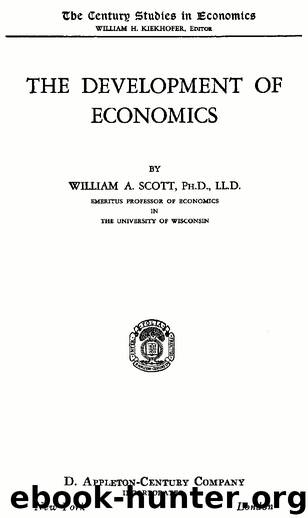The Development of Economics by William A. Scott

Author:William A. Scott
Language: eng
Format: epub
His system of thought may be briefly summarized as follows: Society is an organism created by the division of labor, each person being a cog in a machine engaged in the production, exchange, and distribution of wealth, a mechanism speedily becoming world-wide in scope. Each person thus performs a part in a work in which the cooperation of all is necessary, and the well-being of each one, therefore, depends upon the work of others and the cooperation of nature as well as upon himself.
In this society there are three essential functions to be performed, the adaptation of production to needs, the maintenance of the volume of production up to the standard set by existing resources, and the just distribution of the common product among the producers. At present none of these functions are properly performed. Instead of being adjusted to needs, production follows demand, a very different thing, since it is directed and measured by income, which is very far from corresponding to needs. Production also is very far from being maintained at the standard of existing resources. It is directed by capitalist proprietors with the view to securing maximum profits, heredity playing an important role and frequently placing the control of economic forces in the hands not of the most, but of the least, competent. Wealth is very unjustly distributed, the masses being exploited by the few.
In the attempt to demonstrate these propositions he started with the doctrine that all economic goods are the product of labor and of labor only. This does not mean that labor creates goods, but simply that natural products and forces become economic goods, that is, the objects of human economizing, only by the combination of labor with them. Rodbertus wrote:2
“It signifies in the first place that only those goods belong to the category of economic goods which have cost labor, whose production has demanded effort. All other goods, however necessary or useful they may have been, are natural goods which have no connection with economy, for economy exists for men only because most of the means of satisfying their reappearing and ever increasing needs are never to be found in nature, either in regard to locality or quality, in such a relation to him that he can use them for his satisfaction; because his work is the only means of establishing such a relation and because this work limited in time and power always involves a diminution of his freedom.
“This statement in the second place means that all economic goods are only the product of labor, that economically speaking they can not be regarded as the product of nature or of any other power, for what nature has done for economic goods man may be thankful for since it has saved him so much work, but economy considers it only in so far as labor has completed the work of nature. As goods are on this account economic goods, so they are economic goods on this account only.
“This statement means in the third
Download
This site does not store any files on its server. We only index and link to content provided by other sites. Please contact the content providers to delete copyright contents if any and email us, we'll remove relevant links or contents immediately.
| Fisheries & Aquaculture | Forests & Forestry |
The Lonely City by Olivia Laing(4802)
Animal Frequency by Melissa Alvarez(4474)
All Creatures Great and Small by James Herriot(4323)
Walking by Henry David Thoreau(3963)
Exit West by Mohsin Hamid(3829)
Origin Story: A Big History of Everything by David Christian(3692)
COSMOS by Carl Sagan(3625)
How to Read Water: Clues and Patterns from Puddles to the Sea (Natural Navigation) by Tristan Gooley(3469)
Hedgerow by John Wright(3364)
How to Read Nature by Tristan Gooley(3341)
The Inner Life of Animals by Peter Wohlleben(3319)
How to Do Nothing by Jenny Odell(3303)
Project Animal Farm: An Accidental Journey into the Secret World of Farming and the Truth About Our Food by Sonia Faruqi(3221)
Origin Story by David Christian(3202)
Water by Ian Miller(3188)
A Forest Journey by John Perlin(3077)
The Plant Messiah by Carlos Magdalena(2935)
A Wilder Time by William E. Glassley(2863)
Forests: A Very Short Introduction by Jaboury Ghazoul(2842)
